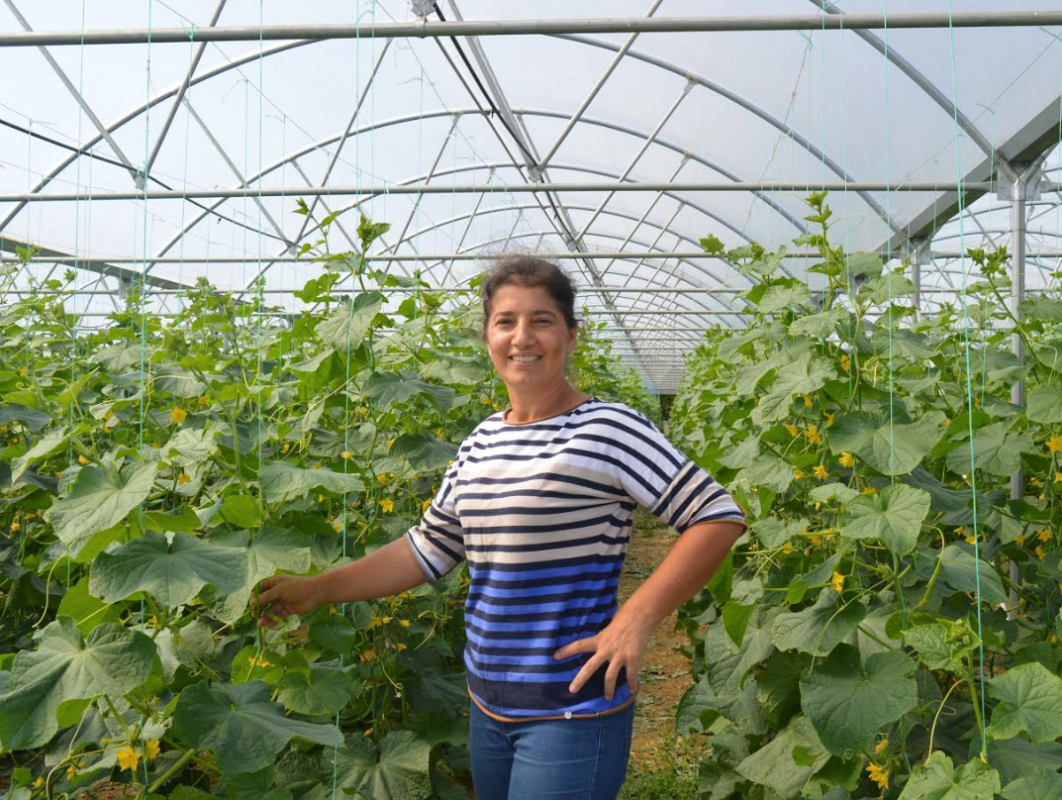It is a common story in post-war Kosovo. After re-building homes and lives, once their children grow up and become independent, women find there are other ways to help families and communities thrive. Often, that new path in life leads them to turn into a profitable business activity whatever it was that kept the family going through the most trying times.
Afërdita Murati, 50, is proud of her line of fresh berry juices and jams, and rightfully so. What started a few years back with a jar of raspberry jam for her children and 10 litres of freshly, hand-squeezed aronia berry juice is now a business selling a growing list of products to over 500 stores around the country.
A chemical lab technician by formal education, earlier in life Afërdita did not have an opportunity to put her knowledge or traditional know-how of working with fruits and vegetables as she way busy raising three children and making a new life in Croatia, where she and her husband, Shaip, had immigrated.
After the war in Kosovo, the family decided to return to Llapashticë, their home village, some 35 kilometres from Prishtina, the country’s capital. A post-card beautiful and serene village in 2019, Afërdita says they had to build everything from scratch when they returned in 2001. “We found everything burned, so we decided to re-build our family home”. It took them two years to move from a one-room dwelling for all into the new house.
In 2014, Afërdita learned that raspberry cultivation was becoming a thing in Kosovo, so she was quick to get involved, and one year later, with 4 ha of land used the yield was high. Finding a market for the quantity did not prove easy due to many farmers producing the same crop.
Using the surplus of raspberry production and recalling the tradition passed on by other women, Afërdita invented a simple jam recipe. At the time, there was a street fair for homemade products by women taking place, so there she went. She sold 10 jars in one day. Then, every day for the next three months, she set up a stand in a large shopping mall in Prishtina where she sold fresh raspberries and her homemade jam.
She began to participate in every food fair she could. “I would never achieve anything without networking. It is the missing ingredient on top of the idea and willingness if you want to achieve your vision,” is Afërdita’s word of advice to any woman entrepreneur. Apart from the business, Afërdita established an NGO to foster networking between women in the region and give them skills to earn a living.
“Afërdita is a role model of emancipation; she has helped many women to engage in gainful activities,” says Shaip, her husband, who works for the family business.
In 2017, Afërdita expanded into cultivation of aronia berry. When this crop too proved difficult to sell, she again displayed the characteristic resilience of so many women like her, who given harsh circumstances and difficult times draw on their will to improve lives and come up with solutions. Her hands being her tools, a simple blender and clean gauze, she made fresh natural aronia juice that sells €15 a litre. As the client list grew, she hired her family and other women from the village to keep up with the demand.
With the support of the municipal authorities and donors, like the Swiss Agency for Development and Cooperation, Afërdita registered her business, bought the first pieces of equipment and built the production facilities. Through Swisscontact support, she purchased an automatic bottle-filling and capping machine. “It took 4 people to work a full day to fill and cap 500 bottles. With this machine, we complete the process in less than 30 minutes,” says a happy Afërdita with the efficiency of the process that translated into more profit.
According to her, donor support, in particular for women-owned business, is the key. Through the collaboration with Swisscontact, she will develop the new brand for her growing list of products, patent her recipes and do a proper marketing plan. Her ultimate goal is to maintain the unique artisanal character of products that differentiates them and begin exporting.
Women account for almost 50% of the Kosovo population of 1,78 million but only 4.9% of them are agriculture landowners. Compared to men, rural women in Kosovo are more involved in unpaid housework and care for family members, on top of unpaid agriculture work. Overall, it is estimated that 13.3% of women in Kosovo are employed.
Swisscontact’s Kosovo project Promoting Private Sector Employment works in the food and natural ingredients sector. Increased women inclusion throughout the value chain is one of the project result indicators. In 2018, all activities in this sector have generated some 357 full time employments of which, 45% for women, and some 1,580 additionally gainful employment for people, of which 42% for women.
Contracted farming is one of the areas that generated the most employment and sales results. Donika Skeli, 43, is one of the women farmers contracted by PPSE’s partner, the collection centre Agrocelina, to grow cucumbers.
As owner of a hair salon in a small town in central Kosovo, Donika made a good living for her family of four. However, her parents and brother back in her home village faced tough times due to unemployment. Having the full support of her husband and two daughters, Donika put on hold her life as a hairdresser and returned to being a full time farmer.
Awarded a start-up grant from the Ministry of Agriculture, she set up a greenhouse in her family land, signed a contract with Agrocelina and employed both her brothers and her father. The collection centre provides her with seedlings and purchases the entire final produce. This is part of the system established with PPSE support.
“I learned farming as a young girl, from my mother; we were always farmers. I am happy to use that knowledge again, this time to help my younger brothers and their families earn a living in their own land, so they do not have to depend on outside employment. The look of happiness in my mother’s face and knowing my family is doing well is all the reward I want,” says Donika.
The stories of Afërdita and Donika, like other similar stories from around the world, stand as testimonial of the key roles rural women play in their families and communities; how everyone benefits when women are given equal opportunities and access to resources.
The story is dedicated to rural women everywhere on occasion of the International Day of Rural Women that is marked every 15 October.
https://www.unwomen.org/en/news/stories/2019/9/announcer-day-of-rural-women-2019





